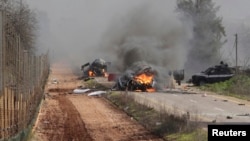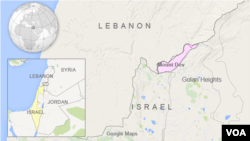Two Israeli soldiers and a U.N. peacekeeper were killed Wednesday, as Israel and the Lebanese militant group Hezbollah traded fire in the biggest escalation of fighting since their 2006 war.
The United Nations urged all parties to use "maximum restraint" to prevent an escalation.
The Israeli Defense Forces said the Hezbollah missile attack on an Israeli military convoy near the Shebaa Farms area of the Golan Heights killed two Israeli soldiers and wounded seven, two of them moderately.
Israeli military spokesman Peter Lerner said the attack by Hezbollah involved anti-tank missiles fired at a military convoy on Mount Dov, along the Israeli-Lebanese border.
The United Nations also confirmed a peacekeeper, a Spanish soldier, was killed in southern Lebanon as the Israeli military and Hezbollah traded fire in the region.
A U.N. spokesperson said the cause of the peacekeeper's death is "undetermined" and is being investigated by the U.N. peacekeeping force in Lebanon.
In light of the flareup, Israel U.N. Ambassador Ron Prosor told the U.N. Security Council on Wednesday that it will take all necessary measures to defend itself after the exchange of fire.
"Israel will not stand by as Hezbollah targets Israelis," Prosor said in a letter to the Security Council. He also urged the 15-member council to "unequivocally and publically condemn Hezbollah" in a letter also sent to U.N. Secretary-General Ban Ki-moon.
The United States condemned the attack, calling it “an act of violence” and called for calm hours after the incident occurred.
“We urge all parties to refrain from any action that could escalate the situation,” State Department spokeswoman Jen Psaki told a daily briefing.
Gaza example
Later Wednesday while meeting with security chiefs, Israeli Prime Minister Benjamin Netanyahu said, "Those behind the attack today will pay the full price."
Netanyahu also warned Israel was prepared to respond forcefully as it did in its offensive six months ago against Hamas-led militants in Gaza.
"I suggest that all those who are challenging us on our northern border, look at what happened in Gaza, not far from the city of Sderot," he said. "Hamas suffered the most serious blow since it was founded."
More than 2,000 people died last year in the 50 days of rocket and missile exchanges between Israel and Hamas, which is allied to Hezbollah.
Hezbollah’s statement suggested the strike on the convoy Wednesday was in retaliation for an airstrike, believed to have been carried out by Israel, that killed six Hezbollah members and an Iranian general earlier this month in Syria.
A similar Hezbollah strike eight years ago led to a month-long Israeli invasion of Lebanon that killed hundreds of people.
Fighting could escalate
A former head of operations in the Israeli military, retired Major-General Israel Zvi, said the conflict could escalate if there are many Israeli casualties.
"Overall in [an] attrition war, it very much depends on incidents. It is kind of a strategy of incidents. You have to take your decision following each event, especially if you try to contain and not to escalate," Zvi said.
"I do believe that Israel understands that it needs to contain it," he said, adding Israel should not take any "steps that would pull us into the chaotic situation in Syria."
Zvi said Hezbollah staged its strike in the Shebaa Farms area, rather than neighboring Syria, where previous clashes have occurred, because it is claimed by Lebanon and that may provide some legitimacy for its action.
Israel said the Shebaa Farms area is part of the Golan Heights it seized from Syria in the 1967 War. Syria and Lebanon say the area is part of Lebanon.
Tensions in the region, where the frontiers of Israel, Lebanon and Syria meet and militant groups opposed to Syrian President Bashar al-Assad are active, have been bubbling for months but have boiled over in the past 10 days.
Hezbollah supports Assad and has sent fighters to aid Syrian forces in that country's nearly four-year civil war. Some fighting has spilled over the Israeli-Syria border, particularly in the Golan Heights area.
'Limited actions'
With an Israeli election looming and Hezbollah deeply involved in support of Assad in Syria, there would appear to be little interest in a wider conflict for either side.
Regional analysts said they did not expect events to spiral.
“Netanyahu most likely realizes that a prolonged military engagement in Lebanon could cost him the [March 17] election,” Ayham Kamel and Riccardo Fabiani of the Eurasia Group told Reuters news agency.
“Instead, Israel will pursue limited actions targeting Hezbollah in Lebanon, but the low-scale, tit-for-tat exchanges will not broaden into a wider war.”
Earlier Wednesday, Israel's military said at least two rockets fired from Syria landed in the Golan Heights Tuesday, prompting Israeli forces to return fire overnight. An Israeli army spokesman said the rocket fire appeared to be intentional, not a product of the Syrian civil war that has sometimes been the case.
Some material for this report came from Reuters.





